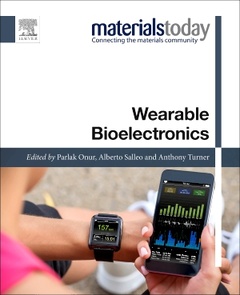Description
Wearable Bioelectronics
Materials Today Series
Coordinators: Turner Anthony P.F., Salleo Alberto, Parlak Onur
Language: English
Subjects for Wearable Bioelectronics:
Keywords
Active switching device; Affinity-based sensors; Battery; Biochemical sensors; Biofluid analysis; Biofuel cell; Breast cancer; Chemical biomarker sensors; Conjugated polymers; Electroactive polymers; Electrochemical capacitor; Electrochemical sensors; Electronic and microfluidic system integration; Enzymatic sensors; E-skin; E-textile; Flexible sensor; Health care; Healthcare; Hyperthermia; Ion-selective electrode; Microfluidics; Noninvasive monitoring; Personalized medicine; Photovoltaic cell; Piezoelectric generator; Sample handling; Self-powered biosensor; Sensor; Smart textiles; Soft actuators; Stretchable sensor; Substrate; Synthetic receptor-based sensors; Thermal actuation; Thermoelectric generator; Thermotherapy; Triboelectric nanogenerator; Wearable antenna; Wearable bioelectronics; Wearable biosensors; Wearable system; Wearable technologies; Wireless power transfer
238 p. · 19x23.3 cm · Paperback
Description
/li>Contents
/li>Readership
/li>Biography
/li>Comment
/li>
Wearable Bioelectronics presents the latest on physical and (bio)chemical sensing for wearable electronics. It covers the miniaturization of bioelectrodes and high-throughput biosensing platforms while also presenting a systemic approach for the development of electrochemical biosensors and bioelectronics for biomedical applications. The book addresses the fundamentals, materials, processes and devices for wearable bioelectronics, showcasing key applications, including device fabrication, manufacturing, and healthcare applications. Topics covered include self-powering wearable bioelectronics, electrochemical transducers, textile-based biosensors, epidermal electronics and other exciting applications.
Part I: Introduction 1. Wearable bioelectronics: fundamentals, challenges, and future perspectives
Part II: Materials, processes and devices for wearable bioelectronics 2. Materials for wearable bioelectronics 3. Mechanics and designs of wearable bioelectronics 4. Manufacturing of wearable bioelectronics 5. Flexible energy devices for wearable bioelectronics 6. Wireless communication systems for wearable bioelectronics
Part III: Wearable bioelectronic systems for health applications 7. Wearable physical sensors 8. Wearable chemical sensors 9. Wearable biosensors 10. Sample-handling strategies in all wearable bioelectronic devices 11. Powering wearable bioelectronic devices 12. Special focus: e-skin 13. Special focus: Textile-based wearable bioelectronics for continuous health monitoring
Materials Scientists and Engineers, academics and researchers working in the area of bioelectronics and biosensors
Alberto Salleo is currently an Associate Professor of Materials Science at Stanford University. Alberto Salleo graduated as a Fulbright Fellow with a PhD in Materials Science from UC Berkeley in 2001 working at Lawrence Livermore National Laboratory on laser-induced optical breakdown in fused silica. From 2001 to 2005 Salleo was first post-doctoral research fellow and successively member of research staff at Xerox Palo Alto Research Center, where he worked with Bob Street on device and materials physics of disordered and polymeric semiconductors. In 2005 Salleo joined the Materials Science and Engineering Department at Stanford as an Assistant Professor. While at Stanford, Salleo won the NSF Career Award, the 3M Untenured Faculty Award, the SPIE Early Career Award, the Tau Beta Pi Excellence in Undergraduate Teaching Award and the Gores Teaching Award, Stanford’s highest teaching honor. Prof. Salleo is a Principal Editor of MRS Communications.
Onur Parlak is a postdoctoral research fellow at Stanford University, Materials Science and Engineering. He received his PhD degree in Bioelectronics from Linköping University, Biosensors and Bioelectronics Centre in September 2015. Earlier, he was visiting research intern at Nanyang Technological University, Materials Science and Engineering Department, Singapore in 2011. He received his master and bachelor degree from Izmir Institute of Technology, Department of Chemistry in 2011 and 2009, respectively.
Dr. Parlak’s research
- Includes comprehensive and systematic coverage of the most exciting and promising bioelectronics, processes for their fabrication, and their applications in healthcare
- Reviews innovative applications, such as self-powering wearable bioelectronics, electrochemical transducers, textile-based biosensors and electronic skin
- Examines and discusses the future of wearable bioelectronics
- Addresses the wearable electronics market as a development of the healthcare industry
These books may interest you

Graphene Bioelectronics 143.27 €

Advanced Bioelectronic Materials 235.69 €


